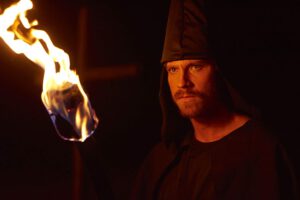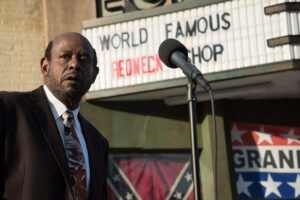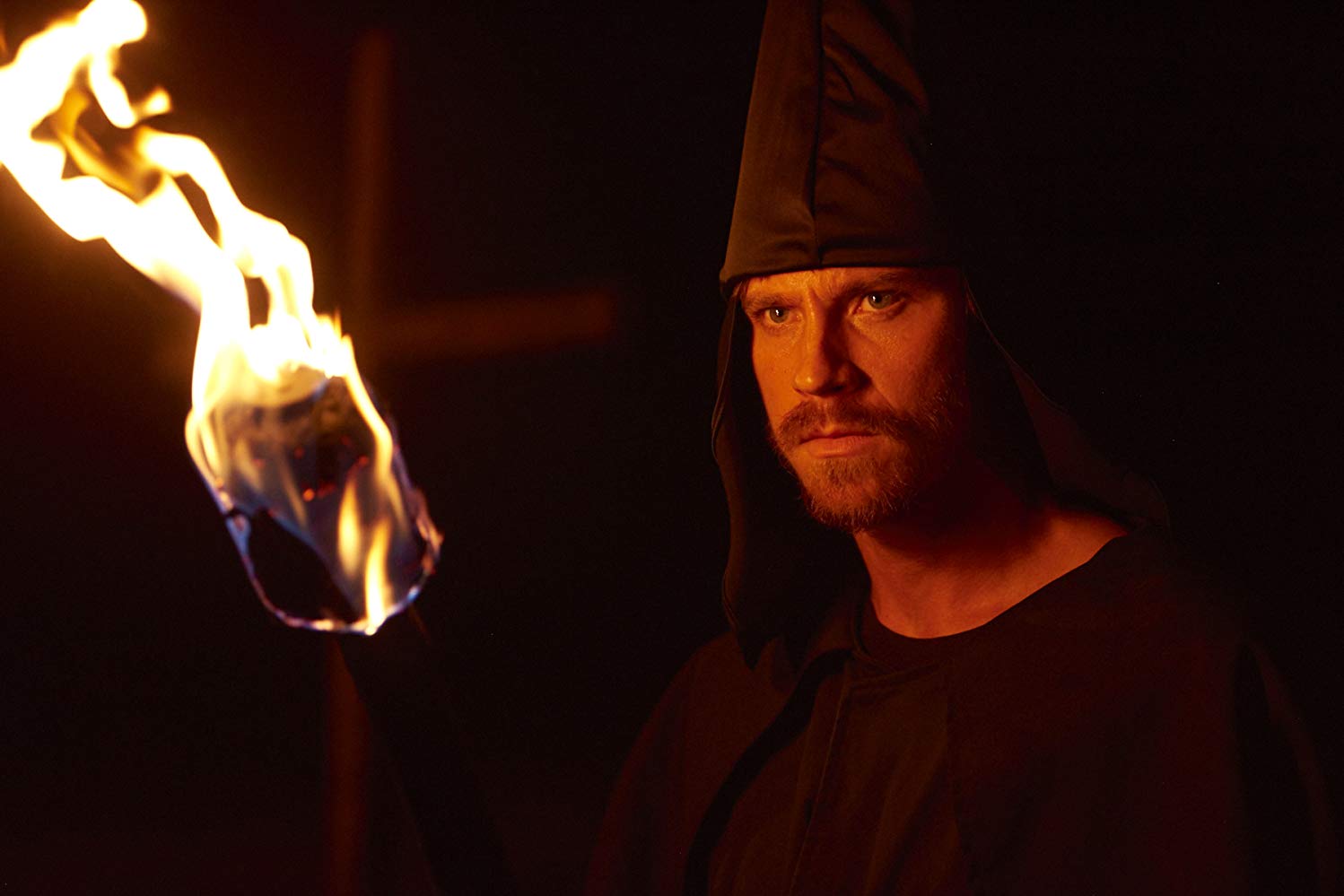Movie Info
Movie Info
- Run Time
- 2 hours and 9 minutes
- Rating
- R
VP Content Ratings
- Violence
- 3/10
- Language
- 2/10
- Sex & Nudity
- 2/10
- Star Rating
Relevant Quotes
You shall not take vengeance or bear a grudge against any of your people, but you shall love your neighbor as yourself: I am the Lord.
You have heard that it was said, ‘You shall love your neighbor and hate your enemy.’ But I say to you, Love your enemies and pray for those who persecute you.
I'm gonna lay down my burden, down by the riverside
Down by the riverside, down by the riverside
I'm gonna lay down my burden, down by the riverside
I'm gonna study war no more

Although writer/director Andrew Heckler never uses the old spiritual in his “based on a true story” film about overcoming racism, the film’s title brought the song to my mind well before the end credits. However, I am sure there is an intentional double-meaning to the title, a young worker named Mike Burden (Garrett Hedlund) being one of two central characters, and his mind, heart and soul being burdened by his hatred of African Americans. Set during the 90s, this is an amazing story that will remind you of last year’s The Best of Enemies, which also told the story of how a KKK member and a black activist became friends. The film should be immune from the criticism of other such films about racism in that it is not an enlightened liberal white man who is the story’s redeeming figure, but a black man.
The man is the Reverend David Kennedy (Forest Whitaker), pastor of a small Baptist congregation who at times leads his people in protesting The Redneck Shop and KKK Museum in Laurens, South Carolina. Yes, you read it right, the leader of the local KKK, Tom Griffin (Tom Wilkinson), had bought an old segregated movie theater, The Echo, and turned it into a store selling tacky KKK merchandise, and in the backroom, had set up the museum displaying segregationist signs, guns, manikins decked out in Klan robes, a Confederate sword, and Confederate flags of all sizes. All this took place in the 90s, over 30 years after Dr. King’s “I Have a Dream” speech! The store’s largest flag was emblazoned with the false claim, “Heritage, Not Hate,” the slogan that defenders of the Confederate flag trot out as a defense against charges that they are prejudiced defenders of slavery.

Mike Burden and the man who had treated him like a son were proof that the flag lies. Born into a dysfunctional family, Burden was largely raised by Tom Griffin (Tom Wilkinson), who mentored him in accepting white superiority and Klan values based on fear, intimidation, and brute force. By day Burden worked as a repro man, loading into the back of his pick-up truck TVs whose owners had fallen behind in their payments. One of the unfortunate debtors had once been his boyhood friend, African American Clarence Brooks (Usher Raymond), but it had been so long since they had played together that Burden at first does not recognize his old friend as he carts off the repossessed TV set. And when he does, their past close relationship no longer means anything to him.
Now Mike is totally caught up in Klan culture, sharing their disdain for blacks and laughing at racist jokes. He joins in the night rituals in which Klansman gather around a burning cross and chant racial slogans and make solemn pledges. He is so immersed in the affairs of the Klan, helping Tom to refurbish the building for the museum, that at one of the Klan meetings his mentor turns over the deed to him in honor of his service. With his unshaved face, ragged jeans and dirty shirt, Mike Burden is the living stereotype of the Southern redneck. During one of the sidewalk demonstrations that Rev. Kennedy leads protesting the museum, Tom, looking out the store window, hands a rifle to Mike and orders him to go up on the roof. He declares ominously that a man has a right to defend his property. Several times Mike has the minister in his sights, but something causes him to hold back pulling the trigger.
There are big changes coming for Mike Burden when he is attracted to single mother Judy (Andrea Riseborough), ironically during a repossession visit to take back her family’s TV set. When she storms angrily out of the house and cannot start her car, Mike walks up to her car, offering to get the balky engine to turn over. Soon they are seeing each other. She is free enough from prejudice that she has several black friends, including Clarence. Even though Clarence tells her that Mike is a Klansman, she sees something in him so hat she does not break things off. One factor might well be his genuine affection for her little son Franklin (Taylor Gregory), who enjoys Mike’s playfulness when they are together.
Slowly Mike moves from the Klan’s darkness to embrace her light. During a fishing trip with Franklin, Mike is surprised that the boy’s best friend is “colored,” but he takes him along despite his initial distaste. During a restaurant meal with Mike, Tom, and another Klansman, Tom tells a racist joke. Though Judy says not a word, her sudden getting up and walking away tells everyone how she detests the so-called funny story. By now Mike has left his basement apartment at the Echo and is living with Judy and Franklin.
When he does break with the Klan, his former mentor warns him there will be consequences. There certainly are, the local cop showing up at Judy’s home telling them they have half an hour to get out because the rent is overdue. Despite their pleas, they are now among the homeless, the lovers and boy forced to spend several nights in their car. Actually, her car, since Tom has taken back the pickup truck Mike had been driving. No one will hire the blacklisted Mike, so he is reduced to begging for “spare change” outside various stores.
Reverend Kennedy has been preaching to his parishioners about both resistance to injustice and love. He proves he is a man of his word when out of pity he spots Mike and treats the family to a restaurant meal. After the black owner refuses to rent a room because of Mike’s Klan membership, the pastor takes the three to his home. He has not informed wife Janice (Crystal Fox) of their sudden guests, so though she is shocked, she manages to restrain her anger, gamely welcoming the three when her husband brings them home. Their teenage son Kelvin (Dexter Darden) is not so accommodating, especially resentful of giving up his own room to the three. Angrily leaving the house, he drives off despite his father’s plea. Others in the community also are upset at the minister’s act of kindness, so it will be an uphill battle, no matter how genuine is Mike’s remorse at being a Klansman. Also looming in the background as a threat to their well-being is Tom Griffin and his hate-filled Klansmen.
In a sermon the pastor preaches that “’perfect love casts out fear’ because fear cannot compete in the same universe with love. These forces are at war with one another, and the weapons we use to fight fear—they are not revenge, they are not hate. They are, and always will be, love….” This is followed immediately by the scene in which a pick-up truck of rednecks at night spot a lone black woman walking home. The truck slows down enough so that the goons in the truck bed can urinate on the startled woman. Mike and his friend Clarence have a narrow escape from a fiery death at the hands of Tom and his former friends—ironically, it is one of the latter who saves them.
Matters do not proceed smoothly for Mike among his new African American neighbors either, some of whom are resentful and suspicious of him. At the construction job that Reverend Kennedy arranges for him Mike gets into a dispute with a black co-worker and in his fury spits out the despicable “N-word.” How the cast-out regains entry into the community of love and acceptance that he has spurned is inspiring, and delightfully ironic in that Mike sells the deed of the old Echo Theater to Reverend Kennedy so that he can have enough money to restart his new life with Judy. What other black pastor in the world can boast that he owns a KKK museum?
The story culminates appropriately in a baptism—yes, “down by the riverside” with Judy and his new black friends singing and looking on approvingly. That his soul is being healed is beautifully expressed in the film’s very last scene in which he is sitting in a wood and he sees a young deer standing and gazing at him. When he beckons it to come closer, we are reminded of a story of his boyhood he had told earlier about a deer and a cruel act of his abusive father. This encounter, with its happy ending, promises that better times, less burdensome times will and replace the wounds inflicted by his past. The scenes of the real Mike and Reverend Kennedy that accompany the end credits confirm this.
As a parable of love overcoming hate, this is a good companion to The Best of Enemies. As Andrew Heckler says in an interview with Megyn Kelly, “The message of the movie is very simple. To paraphrase the Rev, Martin Luker King, ‘You cannot turn an enemy into a friend if you hate. You can only turn an enemy into a friend through love.” * The film puts a human face on those that Northerners too often dismiss as worthless. In a way that recalls the excellent 1998 film about two Neo-Nazi brothers American History X, the camera moves behind the stereotype to discover human beings feeling left out and threatened by change and the need to blame someone else. The film helps us see a Klansman as a human being, as did Will Campbell did in his memoir Brother to a Dragonfly in which how man liberals castigated him for going to visit a KKK grand wizard and discovered their common love for children.
The film offers a good opportunity to talk not just about racism but theology as well, and grace in particular. Rev. Kennedy’s extending a helping had to Mike and family is the beginning of grace, but the need for the recipient to accept responsibility for his dark past is also well played out in the scene in which Mike visits the pastor laying flowers on the grave of his great uncle. When you recall how that relative had died, you see how Mike had been enmeshed in a darkness that extends all the way back to 1619, and beyond.
This film is a “must see.” It opens in L.A. and NYC on Feb. 28, and will gradually spread out to other cities in the following weeks and months. Those of us living in flyover country might be able to see it during the spring. In the meantime you can read Courtney Hargrave’s book of the same name that grew out of the film. Director Andrew Heckler tells me it contains far more details than could be included in his film. I’m on the “reserved” list at my library, and can hardly wait to pick it up.
* (As you can see in my own interview with the director elsewhere in this issue, he makes this same statement at its conclusion.)
Further notes: Journalist Frank Beacham visited the store/museum in 2011 and wrote about it and took lots of pictures. See the result at https://www.webcitation.org/5zS55fL8l. There also is a 12-minute clip in which Megyn Kelly interviews Mike & Reverend Kennedy. This is a real teat to watch:
https://eblnews.com/video/burden-former-kkk-member-mike-burden-left-reverends-help-515584

